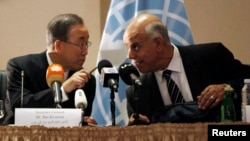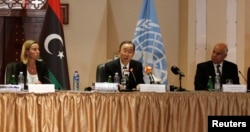U.N. Secretary-General Ban Ki-moon arrived in Libya's capital Tripoli on Saturday for talks with factions fighting for control of the country, in the highest-level visit of a foreign visitor for three months.
Oil producer Libya has struggled with two governments and two parliaments since an armed group from the western city of Misrata seized the capital in August, setting up its own cabinet and forcing the internationally recognized government to move to the east.
The secretary-general “will urge [the] Libyan parties to push forward with political dialog to restore stability to [the] country,” the United Nations said in a tweet.
Fears of a failed state
Western powers and Libya's neighbors worry that the North African country will become a failed state as former rebels who helped oust Moammer Gadhafi in 2011 now fight for control and a share of the vast oil reserves.
Ban will meet a deputy speaker and other lawmakers from the elected parliament, the House of Representatives, which has moved to the eastern city of Tobruk. He also plans to meet with Misrata members of the assembly who have boycotted the sessions.
Two weeks ago, the U.N. started a dialogue to try to end militia fighting. The talks, held in a southern city, have not taken in armed factions from Misrata or a rival militia allied to the western city of Zintan who battled Misrata forces in Tripoli for more than a month over the summer.
But diplomats hope that since Misrata members from the house are indirectly linked to the rival parliament in Tripoli, the talks will start a broader political dialog, not just about the House of Representatives.
"We call for a political dialogue ... and welcome the mediating role the U.N. is playing," Fathi Bashagha, a lawmaker from the group boycotting the assembly’s sessions in Tobruk, told Reuters.
Government struggles
Libya's weak central government and fledging national army have been no match for the well-armed factions, which both claim legitimacy for their roles in the NATO-backed civil war that ended the late Gadhafi's dictatorship.
The situation in Tripoli has been worsened by a separate battle in the main eastern city of Benghazi. There, pro-government forces are battling Islamist militias that have taken several army camps.
An army commander was killed on Friday, army special forces commander Wanis Bukhamada told Reuters. Around 130 soldiers have been killed since August, a separate army source added.
Unknown gunmen also fired rockets at the Labraq airport east of Benghazi, which has become the main entry into the east since fighting closed the Benghazi airport in May. Security sources said no one was hurt.






